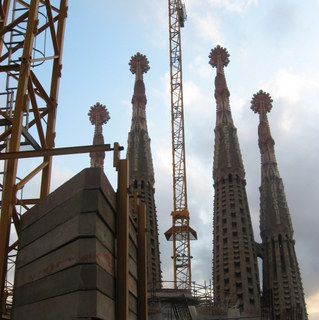This week and next, I start at my new job at a progressive school in Manhattan, teaching middle and high school math. This is my fourth school setting, right on my tenth anniversary of beginning to teach, so some of the anxious edge of the first week of school has diminished. Week one is important, but it is only week one. The first week sets the tone for the year, and you are not the only one determining that tone. You must meet your students to understand that tone fully. And then you create it with them.
Still there is some prep to do — I’m starting standards-based grading for the first time this year, which will take some practice and forethought. Of course it’s a new building and faculty and institution, so I have to learn the little details like where I can stow my papers and who knows how to fix the photocopier, etc. I’ve spent the last few weeks primarily thinking, reading, and writing about theology, so I anticipate a low-level whiplash as I swing around to the nitty-gritty of the teacher’s craft, but one of my goals in writing on this blog is to bring my study of theology, the spiritual life, and the psyche into my practice in a secular classroom.
A progressive school is an ideal setting for this project. Anyone who teaches gets into it (on some level) to relate an intellectual tradition to young people, and to give them the power to engage with it, even create their own contribution to it. Progressive teachers have a broader scope, one that is committed to considering students’ emotional and developmental needs and to integrating students’ context and community (both in the classroom and the wider surround) into the learning process, especially around matters of social justice. A progressive educator might summarize this as such: we are responding to the “whole child,” whom we are preparing for the appropriate and just use of power in a democracy.
When I am asked to respond to the whole child for participation in our society, I take an even wider scope. I ask, how does the psyche influence these young people in their work? How is their unconscious, both individually and collectively, being expressed in our class and the learning process? And finally, and characteristically most difficult to define (defying as it does being pinned down), how does the spirit move in the classroom? These types of questions I think begin to delimit my responsibility to both student and society, and guide me toward creating a classroom that is alive, compassionate, and fostering human freedom.
Remember, I teach math, so I’m seeking alive, compassionate and liberating math education as I begin my progressive education adventure.
My instinct now is to precisely define psyche and spirit, and to indicate exactly where they exist in a classroom dynamic. More helpful is to evoke what these considerations mean for me in practice. When I reflect on psyche and spirit in my classroom’s progressive mission, I ask:
- in what situations do I feel that there is aliveness in my classroom?
- what space exists for students to engage math with spontaneity, creativity, and excitement? how are my student empowered to act with math in mind?
- when do the students become taken up by a power seemingly beyond them in doing their work?
- how can students come to interact with the heart of the matter? what opens them to engagement with ideas that are initially opaque but close to the life of the math tradition?
- when is it clear that we are addressing math as both an objective and subjective phenomena? that is, when are students engaging with math, both as if it exists beyond them, and as if they are creating it?
- can we say we have heard each student’s distinct and authentic mathematical voice?
- where is the material dead? is it because of the material, the kids, or me?
- what are their projections on me, and mine on them? how do I detect these?
- how am i encumbered by my own complexes? i.e. am I afraid to take a risk in the classroom? do my comments and questions come from a place of appreciative evaluation or desire to find something wrong, or because I’m afraid they’ll ask me something I don’t know?
- what is my relationship to the power a teacher has? what should be my use of that power?
- where has power emerged in the room, specifically the power to create math, a freeing intellectual power that uses knowledge rather than simply recites it?
Note that these questions are not exhaustive of the general pedagogical questions that I have to ask myself to fulfill my role. Those questions include: what are my students learning? how can they best demonstrate their learning for me? what feedback do they need from me? how are they involved with their learning process? how am I empowering them to participate in this process? and so on.
However, when I consider psyche and spirit in the classroom, I’m seeking the source of life, community, trust, and creative power that a progressive pedagogy intends to harness and develop. As a result of considerations like this, I’ve chosen the phrase, cultivating my students’ power to create mathematics together to be my watchword, my measure of trustworthiness, my regula fidei (so to speak), for how I structure my class.
More on that, and on specifics for how I imagine my classes looking, to come.

3 Comments